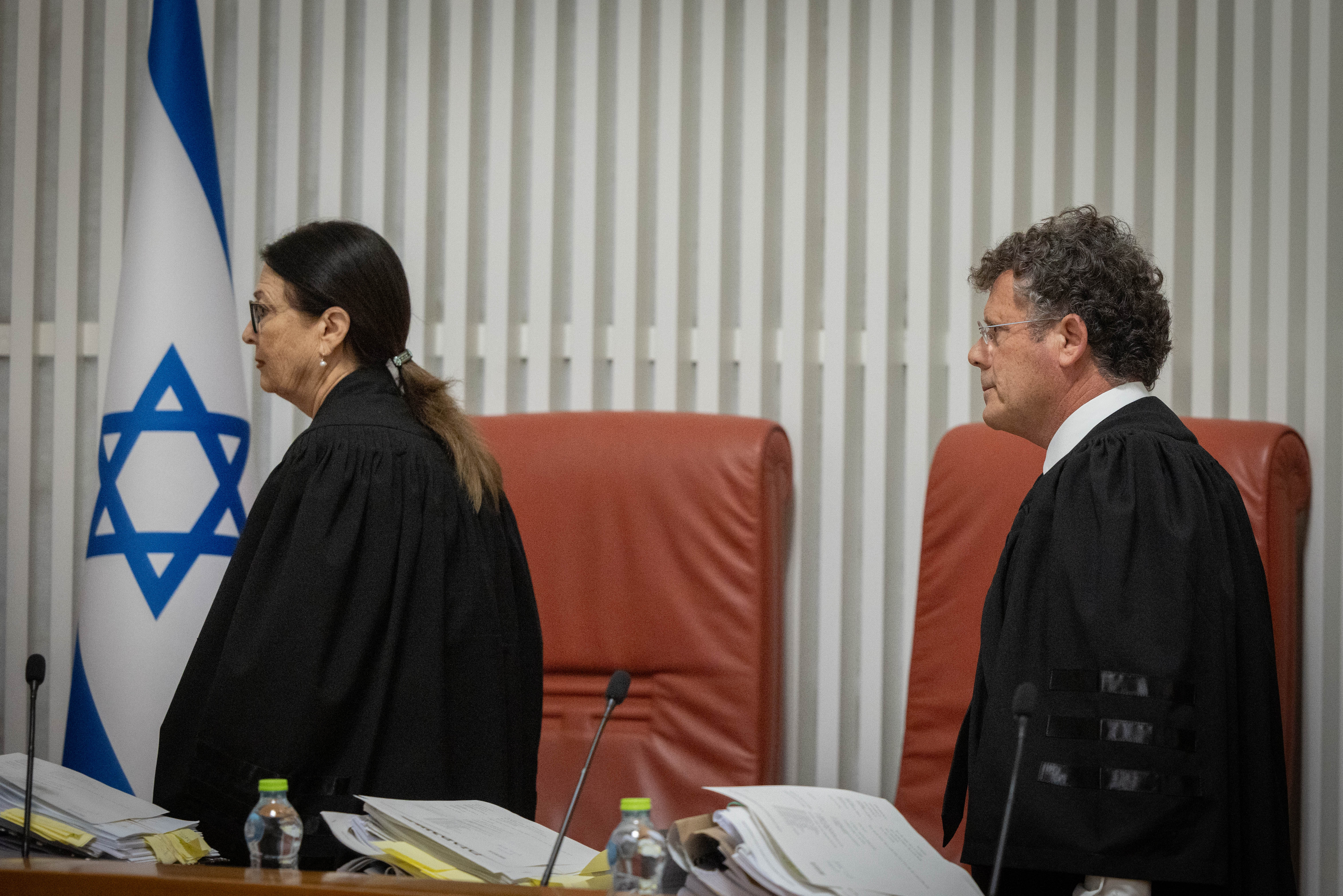Israel needs a strong supreme court now more than ever
Justice Hayut's retirement from the presidency of the Supreme Court was well-known in advance, however, the Minister of Justice's refusal to convene the Judicial Selection Committee leaves Israel with a temporary replacement during a national emergency.

Photo by Chaim Goldberg/Flash90
The term of office of Supreme Court President Esther Hayut came to an end this week, inviting a review of her presidency from various angles, such as her rulings on different topics, or her determined defense of the status of the judicial branch. But unfortunately, during the crisis in which we now find ourselves, the retirement of Justice Hayut shines a light on the judicial system finding itself in a weakened position during an emergency.
Justice Hayut’s scheduled retirement from the presidency this week, having reached the age of 70, was known well in advance. Yet the minister of justice, Yariv Levin, has refused to fulfill his duty of convening the Judicial Selection Committee, making the appointment of a new president of the Supreme Court impossible. The minister wants to change the composition of the Committee before it is convened, seemingly so as to ensure that the next president is not chosen on the basis of seniority as customary.
By law, if the position of president of the Supreme Court becomes vacant and a new president is not appointed, then the deputy president performs the president’s duties instead and is awarded the president’s powers. There is no doubt that the current deputy president, Justice Uzi Vogelman, will perform this role in the best possible manner. However, it should be remembered that he is also expected to retire from the Court in around a year’s time, and has already given notice that he is not interested in serving as president. In any event, the outcome is that instead of the judicial branch being headed by a permanent Supreme Court president, it is now headed by a temporary replacement.
Several months ago, I wrote that the decision of Justice Minister Levin not to convene the Judicial Selection Committee was scandalous (a petition against this decision was filed with the Supreme Court some time ago). It is as a result of this decision that courts throughout Israel are currently operating without the required staffing complement, due to retirement of judges: This month alone, two Supreme Court justices have retired out of the total of 15 (President Hayut and Justice Anat Baron), but judges in other courts have also retired, and by the end of 2023 there are expected to be 54 vacant positions of judges and court recorders. The commissioner for public complaints against judges will also be retiring soon, and a new commissioner cannot be appointed unless the Judicial Selection Committee is convened.
The Justice Minister’s decision is now also damaging the position of Supreme Court president. Having a temporary replacement serve as the head of the Supreme Court would be problematic at any time. The Supreme Court president is not only a judge with important and unique judicial powers; the president is also the leader of the judicial branch and is responsible for representing it and defending its status and independence. No less important, the president has powers relating to the administration of the court system in general, and the management of the Supreme Court in particular. A temporary replacement will find it more difficult to make significant decisions for the leadership of the judicial branch than would a permanent president.
In a national emergency, having a temporary replacement is far more problematic. Since the attack by Hamas on October 7, the court system has been placed on an emergency footing, following an order issued by the justice minister with the agreement of then-President Hayut. Due to the special state of emergency declared by the minister, the activity of the courts has been curtailed, and they are currently hearing only urgent cases, such as arraignment hearings or urgent petitions to the High Court of Justice. Yet it is in such circumstances that the access of Israel's residents to the Supreme Court must be maintained. It is important that the president of the Supreme Court is able to decide, independent of the government or of any other body, whether a particular petition against the government is urgent, possibly even a petition regarding the emergency itself, and should be heard immediately. The government has been granted huge powers in the current state of emergency, and thus it is particularly important that an independent body—the Supreme Court—is able to continue to provide oversight of the government and thereby protect the rule of law and human rights.
The actions of the government and the justice minister have led to a weakening of the Supreme Court, which during a national emergency is not fully staffed and does not have a permanent president. Incidentally, it is the president of the Supreme Court who also has the power to appoint the members of the commission of inquiry that will have to be established after the war, in order to investigate the events that led to the success of Hamas’s surprise attack.
